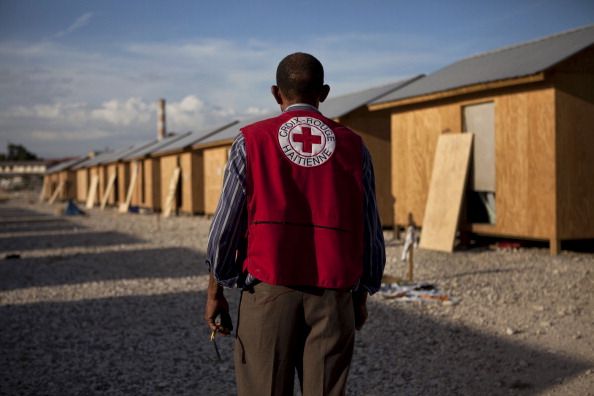Why Donating To The Red Cross To Help Haiti Is So Problematic
A transitional shelter project led and financed by the International Committee of the Red Cross is shown in January 2011 in Port-au-Prince, Haiti. | Source: Jonathan Torgovnik / Getty
Anyone who has a heart is likely wondering how they can help the people of Haiti recover from the devastating natural disaster the nation suffered last Saturday. The problem is many of us just don’t know which organizations to donate to—or rather, which ones not to give their money to.
One organization that keeps popping up on the “do not donate” list is the American Red Cross, which has an unflattering history with Haiti and its “efforts” to provide relief to the nation through donations raised after it had been rocked by massive earthquakes and hurricanes.
In 2015, NPR and ProPublica published an investigative report that found the Red Cross raised close to $500 million for relief efforts in Haiti after the Caribbean nation suffered a 7.0 magnitude earthquake in 2010 that killed more than 100,000 people. The only problem? Nobody in Haiti appeared to have any idea where all that money went. According to the report, the Red Cross boasted that it had provided homes to more than 130,000 people who were displaced by the earthquake, but the number of permanent homes investigators found the charity had actually built is six.
MORE: Wyclef Asks People To Help Haiti After ‘Another Earthquake’: Here’s How To Do Your Part
“Five hundred million in Haiti is a lot of money,” Jean-Max Bellerive, who was Haiti’s prime minister until 2011, said, according to NPR. “I’m not a big mathematician, but I can make some additions. It doesn’t add up for me.”
The report also noted that on the Red Cross’ website and in its press releases, the organization claimed the money went to help 4.5 million Haitians get “back on their feet,” but Bellerive responded to that saying, “No, no, not possible, we don’t have that population in the area affected by the earthquake.”
“4.5 million was 100 percent of the urban area in 2010,” he continued. “One hundred percent. It would mean the American Red Cross would have served entire cities of Haiti.”
The Red Cross disputed the findings of the report and any allegations that it had mismanaged the funds it raised. The organization even provided a breakdown of how the money was spent claiming around $148.5 million was spent in the first six months after the earthquake to provide food, water, medical care and emergency shelter for citizens.
So, at the very least, we know there’s a lot of ambiguity and uncertainty regarding the Red Cross’ track record for using donations to help the people of Haiti, and now that the nation has suffered another massive earthquake, the attitude of many people is simple: We shouldn’t be taking any chances this time around.
Please do NOT send money to the American Red Cross!!!
If you have family & friends in Haiti, send money directly to them.
I will post a list of trusted organizations in this thread if you’d like to help the people of Haiti.
— Bibi (@bibicosplays) August 14, 2021
If you don’t have family or friends in #Haiti you can send money to directly, please don’t rush to send money. Please, please don’t send to large international organizations like the American Red Cross, which have a terrible record in Haiti. (1/n)
— Laura Wagner (@TiLauraRose) August 14, 2021
As you consider sending money to Haiti do not send money to the Red Cross. I like Fonkoze and Hope for Haiti who do a lot of great work on the ground, with efforts led by Haitian people.
— roxane gay (@rgay) August 14, 2021
A reminder as we all stretch towards Haiti during this awful time:
Haitians have consistently asked people NOT to donate to the Red Cross to support the island.
I’m working on refreshing the local org list compiled after Hurricane Matthew and will share as soon as I can.
— ashley yates (@brownblaze) August 14, 2021
Fortunately, there are plenty of alternatives to donating to the Red Cross—and many of those options come out of Haiti itself.
NewsOne has already published a number of sources and advice on best practices when it comes to donating to Haiti including a list of charitable resources that was provided by the Haitian Education & Leadership Program following Hurricane Matthew, which devastated the nation in 2016. The Haiti Advocacy Working Group (HAWG) also put together a list of best practices for giving money to the region after Hurricane Matthew.
There are other Haiti-based organizations such as Fonkoze, HaitiOne, and the Haiti Emergency Relief Fund that are urging people to aid them in relief efforts.
There are many ways to help. We just need to know that the funds we donate are being used to do just that.
SEE ALSO:
After Haiti Earthquake, Cori Bush Leads Calls For U.S. To Take More Refugees
U.S. Tells Haitians To ‘Not Come To The United States’ After President’s Assassination
[ione_media_gallery id=”4185716″ overlay=”true”]

